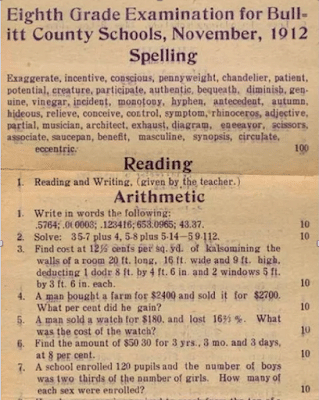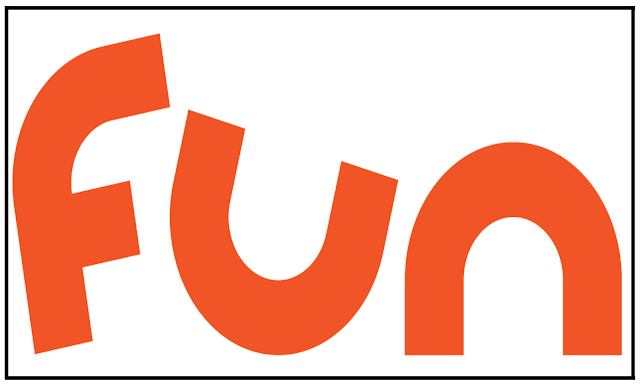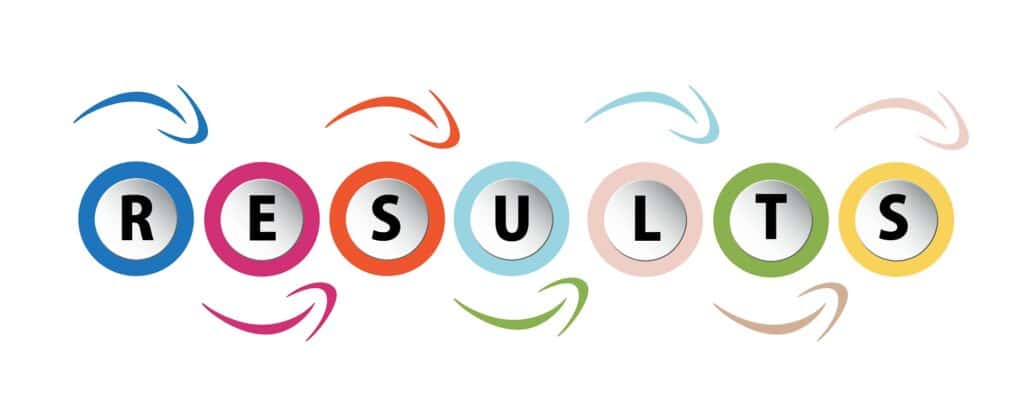
The big thing in education-speak is to be ‘learning focussed’. In one sense that’s obvious – schools are all about learning, of course – but it’s not always entirely clear what that might mean in practice. When there is so much ‘stuff’ students can learn, what should we focus on in the limited time we have? This question has always been there, despite what we often hear about the unique times we live in, and an historical perspective sheds some light here. I came across a grade 8 entrance exam from 1912, and it makes for fascinating reading. Passing quickly over the rather intimidating spelling test you can see in the diagram, we note in the Arithmetic section (note – not Mathematics, which is different) some familiar pieces for that age group (Pythagoras’ theorem in q8), some questions we would regard as trivial (35.7 plus 4 in q2) and some that I cannot even understand (q10?). You can download the whole test here and see how much education has changed. We expect completely different things from our children.
Yes, we expect them to know much more in some areas. It would be a mistake, however, to overlook the things we no longer expect our children to know. Writer Robyn Harris notes that in 1912 “I would probably have known how to raise and groom a horse, which type of wood would make the best fire and how to cut it just right, how to write consistently with a dip pen, how to hand crank an engine without injuring myself, how to load a powder rifle without blowing myself up, how to shave with a straight razor without killing myself, and so many different things that I just don’t need to know today” and Historian James Burke puts it as “people in the past weren’t stupid, they just knew different things.”
So the test linked above really shows what was valued at the time. Clearly, knowing a lot of facts was seen as an end in itself, and that’s perhaps the most significant change. These days we tend to see the facts as some of the stepping stones to the ultimate aim of understanding, and that difference brings to our mind the necessity of the other elements needed for understanding, two of which I bring to your attention now.
The first relates to the notion of perspective. We know that our own perspective on any given matter is one of many, and we know that we will deepen our understanding if we know other perspectives. So we intentionally build perspective-taking into our programmes; in, for example, Global Perspectives, Digital Perspectives and Theory of Knowledge, and also in broader opportunities. One such opportunity is the East Campus Asian Arts and Culture Week, which takes place 9-13 February 2015, and is far more than just a celebration of the Arts. The purpose of the week is to use the Arts to engage, entertain and ultimately enlighten students, staff and parents on the many layers and perspectives in our wonderful host country in its 50th year. We will be sharing our skills, crafts, knowledge and experience of this island through workshops, talks, classes, forums and exhibits. We have a packed programme starting with a lion dance on Monday in preparation for lunar new year and finishing with Tai Chi on Friday. Arts workshops will be focusing on Silat, Dikir Barat, Beijing Opera and Bharatanatyam. Parents can undertake Peranakan master classes in tile making and cooking, and we will have an archeologist talk about our dug up treasures as well as a ghost story teller. Our plaza will be turned into a Singapore cultural village and a hub of information. There will also be a Beijing Opera workshop and special Chinese New Year lunch for our service providers served by our students. And of course on Friday we will have a special celebration day in whole school Singapore dress and tasting hawker food in our cultural village watching performances of the arts from the week. Written like that, it would be easy to mistake the exciting week as an end in itself; it is, rather, a statement of the value of a quality that is vital one for our students. Please do get involved and encourage your children to do so too! Watch out for the full details which will be released shortly.
Ideas around Technology and Sustainability also provide two other ways we can support deeper understandings for our students, and these are issues that are so infused in modern life that we couldn’t really say we were appropriately educating students if we did not address them. Once again, we do this in regular lessons, and once again we also have additional opportunities for engagement. Using technology sustainably is a theme explored in two upcoming and very exciting events; TechLife (7th, 8th February) and TEDx (7th February). These student-organised events bring up important perspectives in futures thinking and what’s more, by proposing, managing, organising, leading and running these conferences, our students understand the complexities of management that are a long, long way from the kinds of learning that may have been so important back in 1912. So please do come along.
And if you have plenty of time on your hands, you might try the Grammar or History sections of the test linked above. I’m just glad I am not trying for entry into 8th grade.


